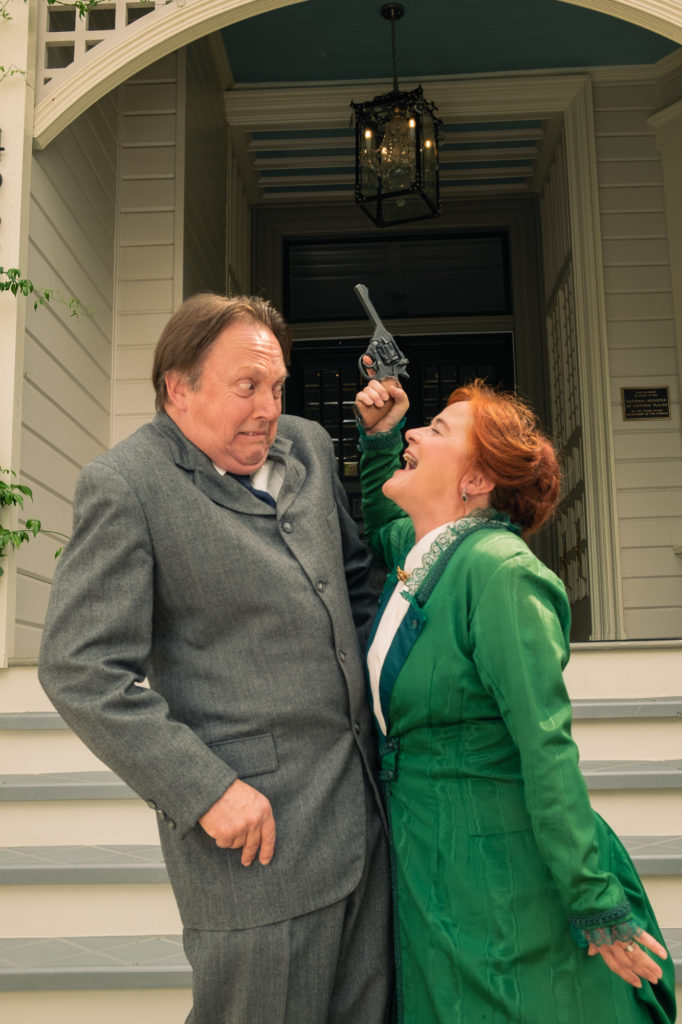Review: A 21st century “Hedda” triumphs in Valley Players’ production
JOHN HENRY MARTIN Oct 12, 2022

You don’t need to read Henrik Ibsen’s famous 1891 play “Hedda Gabler” in order to follow Valley Players’ production of “Resolving Hedda,” but having some background will make the experience much more rewarding.
In Ibsen’s original, as a result of some thoroughly 19th century type intrigue and scandal, Hedda commits suicide. But playwright Jon Klein thinks that this is unfair to the poor woman. His Hedda is aware of her fate and does everything she can to frustrate the events in the play to prevent her own death.
It’s as if Hedda has traveled to the 21st century, and gone back to the 19th, becoming aware of how misogynist the play is — even though scholars consider Ibsen to be a proto feminist. She references the Bechdel Test, which is a concept Alison Bechdel (the cartoonist who wrote the Tony award-winning play “Fun Home”) created to describe plots in which two women talk about something other than a man. The original Hedda Gabler, with Hedda’s unhappy marriage to George and suggestion of an illicit affair with Eilert, does not qualify.
She is also aware of other 21st century conventions like irritable bowel syndrome, bipolar disorder, Uber, electric paper shredders and Kellyanne Conway. All of the other characters are perplexed by these things she mentions in passing that won’t be invented, or at least named, for another 50 to 120 years. But they don’t have the curiosity to inquire further.
Their fates, however, are determined, and they march steadily along to the play’s inevitable conclusion, regardless of Hedda’s attempts to frustrate the plot.
June Alain Reif is brilliant as Hedda. It is an extremely demanding role, requiring her to constantly panic, conspire and impatiently exasperate over the bumbling of her costars. Her speech is quick, with sarcastic asides, and she patronizes the other characters for their ignorance. She is the only sane one in the show, and she is on stage for the entire 2½ hour performance.
Richard Pallaziol plays her befuddled husband George. He is a cartoon character, right out of Looney Tunes, so obtuse that he twice mistakes Hedda’s make-out sessions with both Judge Brack and Eilert for their trying to find something in her eye. His performance is a bit preposterous, more believable as an Italian clown rather than a Norwegian academic. But I think that is the point.
For the whole first act, and much of the second, Hedda’s scheming comes to nothing. All of the machinations in the original take place, their fates inescapable. One begins to wonder how this play could possibly end without Hedda’s suicide.
Well, it’s not giving anything away to say that she doesn’t commit suicide. But how Klein handles this is absolutely brilliant. The play ends up being a postmodern joke about what we expect when we go to the theater. The standard conventions and predictable plots are turned upside down in the last 10 minutes when the fourth wall is shattered.
Valley Players’ mission to present plays with strong female leads is so refreshing. It has brought many extremely interesting theatrical experiences to the valley. This very clever play among them, epitomizes everything I enjoy about this little theater company.
Artistic director Debbie Baumann, who directed the show and with whom I spoke beforehand, said she was extremely enthusiastic for the future. If I can look forward to more shows like this, I am, too.
